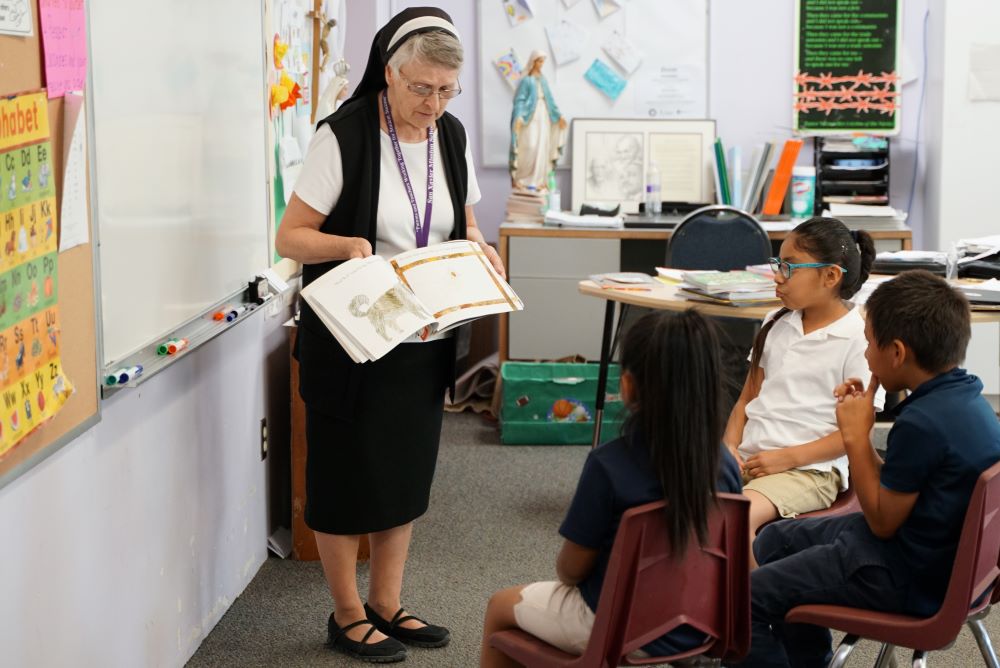
Sr. Rosalyn Muraski, a member of the Franciscan Sisters of Christian Charity, serves as a special interventionist at the San Xavier Mission School on the Tohono O'odham Nation reservation in Tucson, Arizona (Courtesy of Franciscan Sisters of Christian Charity)
With only three Catholic sisters residing at the majestic San Xavier del Bac Mission on the Tohono O'odham Nation reservation in Tucson, Arizona, it might seem unlikely their impact would extend far beyond the 330-year-old structure's ornate façade and milky white towers.
But with each sister wielding specialized skills and boundless energy, their ministry has affected the lives of hundreds of tribal members, migrants and unhoused individuals.
This includes conducting outreach across the reservation — one of the country's largest — as well as contributing to large-scale migrant assistance in their Pima County community, which received over half a million asylum seekers from 2019 to 2024.
"We're very compatible and we have lots to share," Sr. Carla Riach, 79, a member of the Franciscan Sisters of Christian Charity, said about the sisters' efforts outside the mission. "It works very well."
After teaching for 19 years in multiple states, Riach arrived at the Tohono O'odham Nation reservation in 1986, tasked with providing pastoral ministry throughout the predominantly Catholic reservation.
This proved no small feat, even with several sisters there to help at the time. The reservation encompasses 11 districts with dozens of communities across 2.8 million acres, "about the size of Connecticut," Riach said.
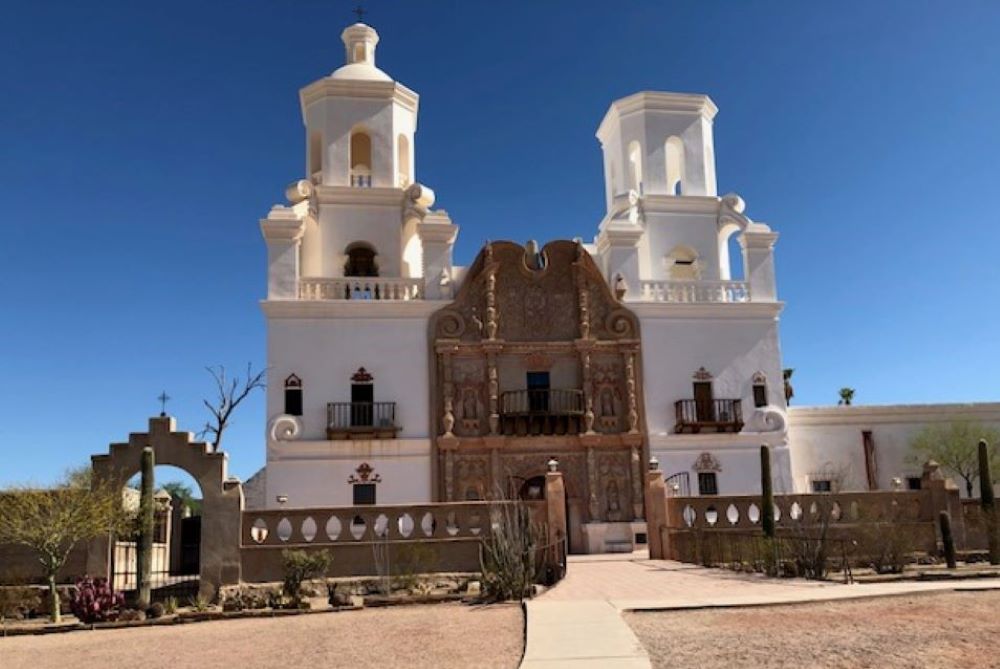
Three Catholic sisters live at and minister from the San Xavier del Bac Mission on the Tohono O'odham Nation reservation in Tucson, Arizona. (Courtesy of Franciscan Sisters of Christian Charity)
The sisters rotated through multiple villages daily, she said, organizing Mass at every community throughout each week. They also held evening classes, training lay ministers to serve as their village's spiritual leaders.
"I was younger then, so it worked out," Riach said of accessing the reservation's roughly 10,000 tribal members. Jesuit Fr. Eusebio Francisco Kino introduced Catholicism to the Tohono O'odham in the 1600s, she said, Francisco also founded the San Xavier del Bac Mission.
During her 17 years of pastoral ministry, Riach and her fellow sisters emphasized honoring tribal culture alongside Catholic worship, she told Global Sisters Report. That included inviting tribal singers to share their music at Mass and translating Bible passages into the Tohono O'odham language.
"I had to adjust to another culture," said Riach, who previously taught at the Gila River Indian Community in Arizona. "It wasn't all that hard, because the people were so friendly."
Tohono O'odham Nation member Manuel Martinez, 42, acknowledged that many tribal members have a complex relationship with Catholicism, due to "the historical hurts that were inflicted on our people," such as abuses at religious boarding schools and the church's role in white society's attempt to erase tribal culture.
"These are complex topics, but they need to be discussed for healing to occur," Martinez said, adding that "you see the vitality of the Catholic faith shine through" during joyful occasions like feast days for villages' patron saints.
His relationship with Riach has only benefited his life, Martinez said.
After they met in 2001, she became "like a second mother to me, spiritually," he said, mentoring him through his advancement in parish ministry and serving as his "main confidant" when he came out as gay.
"Sister Carla is the only individual with whom I can be myself, no pretense," he said.
Through Riach's support, Martinez now serves as a lector like his late aunt before him, reading Scripture in the Tohono O'odham language as she did. He also serves as a eucharistic minister and a liaison between the parish and the reservation's Wa:k community.
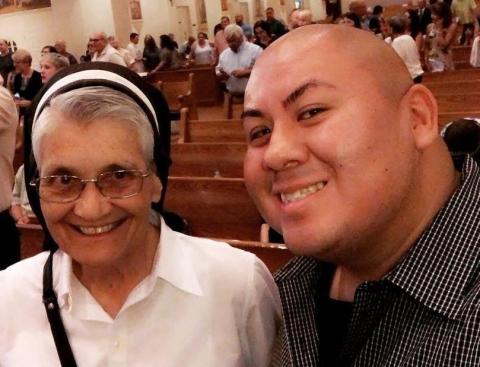
Sr. Carla Riach, left, has served as a mentor to Manuel Martinez, a member of the Tohono O'odham Nation, and supported him in taking on roles like lector and eucharistic minister. (Manuel Martinez)
"These ministries are important to me because of the generations of my O'odham relations and community members who came before me who used to occupy these ministerial capacities," he said. "(Riach's) love and acceptance have encouraged me to improve and contribute to occupying roles and seats at tables that I never felt worthy of."
Supporting women and children
Riach's outreach also extends beyond tribal members' spiritual needs.
"When I was out on the reservation, we saw that so many of the women had been abused," she said. "We decided we were going to do something."
She and the other sisters created the Women Healing Women organization, organizing regular abuse support groups for women from across all the reservation's villages.
"It was amazing to see the change," Riach said. "When they came in, they'd be so burdened, and when they'd leave, you could see they were perked up."
Since she transitioned from living in a convent on the reservation to the San Xavier del Bac Mission in 2002, Riach has collaborated with community members to provide similar outreach at the mission, including yearly therapeutic workshops for women.
"A big part of the workshops is figuring out how they're going to move ahead in their situation and see the power they have within," Riach said. "We've seen a lot of growth with the participants."
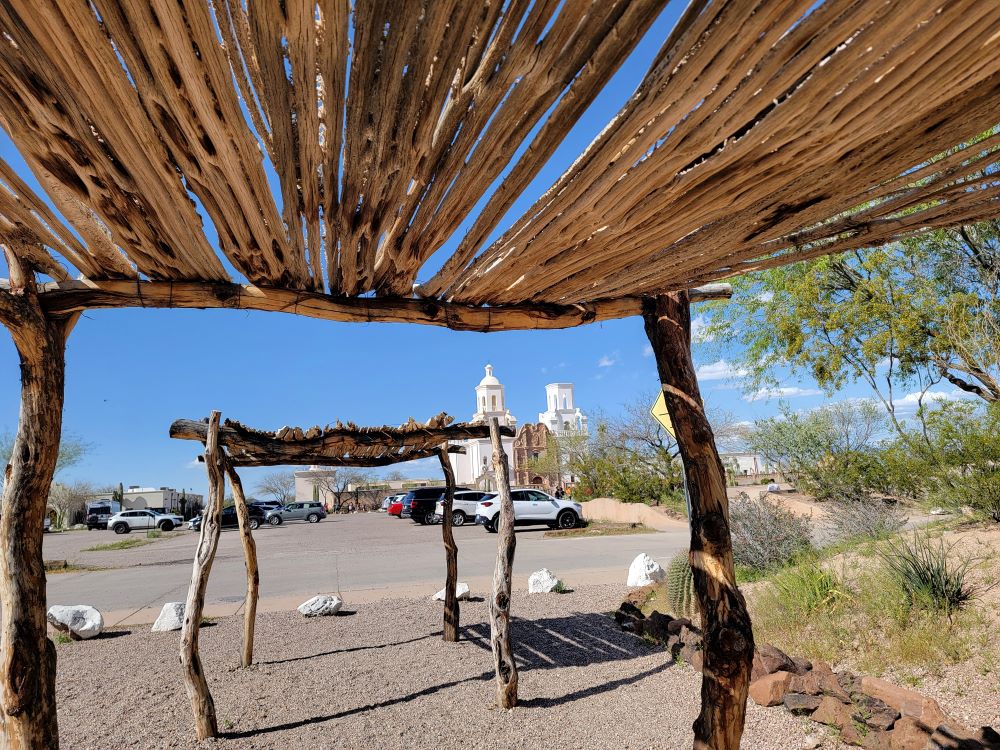
Mission San Xavier del Bac, Tucson, Arizona, is seen from nearby marketplace sales huts in 2024. (Wikimedia Commons/CC BY-SA 4.0/Jim Heaphy)
Sr. Rosalyn Muraski, a 79-year-old member of the Franciscan Sisters of Christian Charity also resides at the mission, nurturing younger generations of tribal members.
As a special interventionist at the San Xavier Mission School, founded on the reservation in 1864, she assists students from kindergarten through eighth grade with behavior and academic challenges.
"I was always called to teach children with special needs," said Muraski, who holds a master's degree in special education and trained special education teachers for 29 years.
Also serving as sacristan at the mission church, she further volunteers at the reservation's education center, assisting elementary students with homework, reading, learning the tribal language, making crafts and engaging in social activities.
"The sisters' presence has left and continues to leave an impact on our hearts," Martinez said. "Their educational and prayerful presence has helped us fight for our rights and dignity as tribal people and people of the desert who deserve to be represented and heard."
Franciscan friars also minister at the mission church.
Addressing migrant needs
Sr. Marlita Henseler, also a Franciscan Sister of Christian Charity, long found herself drawn to migrant ministry.
Henseler's decades as an educator and administrator included serving 12 years as a principal at a Peruvian school. She witnessed locals' hardscrabble existence, leading her to later volunteer at the Kino Border Initiative's migrant shelter on the U.S.-Mexican border.
Sr. Marlita Henseler, a member of the Franciscan Sisters of Christian Charity, teaches English classes for older Hispanics at a low-income senior housing community in Tucson, Arizona. (Courtesy of Franciscan Sisters of Christian Charity)
"I saw firsthand the struggle of those escaping real terrorism in the remote, mountainous areas of Peru," she said. "My heart goes out to those who share that circumstance, as many immigrants from Mexico and Central America do."
Inspired to aid people seeking refuge in America, she joined the San Xavier del Bac Mission in 2022 to assist at Pima County's Casa Alitas migrant shelter, which Catholic Community Services of Southern Arizona funded to assist legally processed asylum seekers.
An hour from the U.S.-Mexican border, the shelter received hundreds of asylum seekers daily, Henseler said.
"These were busloads of people who the border patrol had checked their backgrounds, gave them papers and let them cross," she said. "Our job was to process them and get them to their destinations."
Henseler pitched in, feeding asylum seekers, helping them book flights and navigate bus routes, and comforting those who had endured grueling hardship.
"It took months for some to get to the border, and they came to this safe haven where someone was treating them like a person and not a criminal," she said. "It was just heartening work."
With the majority of migrants hailing from Latin American countries, Henseler recalls hearing grim stories every day of people fleeing from pervasive violence and crime.
"They were forced to look elsewhere to live in peace," she said.
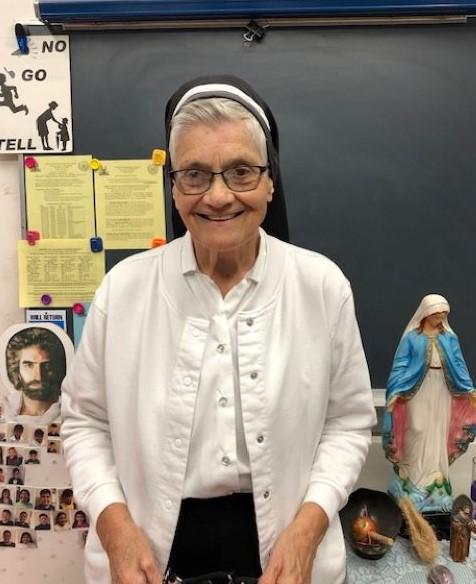
Sr. Carla Riach, a member of the Franciscan Sisters of Christian Charity, has provided pastoral ministry across the Tohono O'odham Nation reservation for 17 years. (Courtesy of Franciscan Sisters of Christian Charity)
This option ended in the first month of 2025, when President Donald Trump's crackdown on immigration closed the border to asylum seekers. Ending the flow of migrants to the shelter, this caused it to lose its funding and shutter for good.
"Most of the staff was in tears," Henseler said. "We were all there because we wanted to help these migrants get started in their new life."
But she found other ways to make a meaningful impact.
Henseler now volunteers at the Casa Maria Soup Kitchen in Tucson, where she helps prepare and distribute donated food to those in need. She also does laundry for unhoused women twice a week at Tucson's San Jose Women's Center.
"I keep seven washers going for four hours," she chuckled. "This is just helping them feel like a person. Who doesn't feel good, if they have clean clothes to wear?"
Seeking other opportunities to support Latinos, she also teaches a biweekly English class at Barrio Viejo Elderly Housing in Tucson.
Advertisement
Attendee Francisco Yescas, 85, praised Henseler's classes as helping many Hispanic seniors learn conversational English to better communicate.
"You don't want to be asking for a translation every time you go to get groceries," said Yescas, adding that many who attend speak minimal English. "They're learning very well because (Henseler) has a lot of patience."
Although Yescas speaks extensive English after immigrating from Mexico to the U.S. in 1982, he said he still benefits from her class. He never formally learned English, he explained, as only wealthy youths attended school where he grew up.
He appreciates how Henseler shows up an hour early simply to chat with everyone, he told GSR.
"She likes to get involved with the people," he said. "She's my close friend."
All three sisters also make themselves regularly available at the mission — Arizona's oldest European structure — where tribal members, tourists and others from across southern Arizona constantly stream in seeking blessings and support.
"Some want you to pray with them, or some just need to talk and you might never see them again," Riach said. "It's about just being here. Being present."




